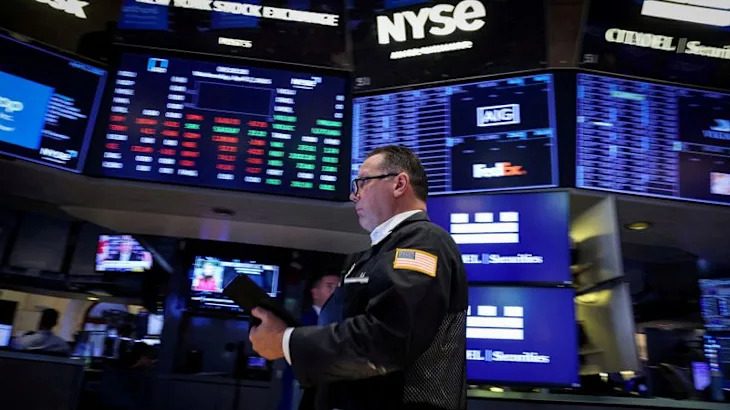
S&P 500 on pace to confirm bear market as Trump's tariffs hammer stocks
By Shashwat Chauhan
(Reuters) -The S&P 500 index slumped further on Monday and was down more than 20% from its all-time highs, putting the most closely followed benchmark for U.S. equities on track to confirm a bear market.
The Dow Jones Industrial Average was down more than 17% below its record high, while the Nasdaq confirmed it was in a bear market last week as fears of a recession following U.S. President Donald Trump's sweeping tariffs pounded global stocks.
An index confirms it has been in a bear market if it closes more than 20% below its record closing high, according to a widely used definition.
The last time the S&P 500 confirmed it was in bear market territory was in June 2022 when investors were worried whether the Federal Reserve would be able to tame post-pandemic inflation without causing an economic downturn.
Bear markets often lead into a recession and last until investors think that the worst of the economic downturn is behind them. Nine of the 12 bear markets since 1948 have been accompanied by recessions, according to investment research firm CFRA.
The tariff mayhem has led Wall Street brokerages to raise their odds for a U.S. recession, while traders have ramped up bets of interest rate cuts as Trump shows no sign of backing off after imposing sweeping tariffs on U.S. imports.
Trump said on Sunday that investors would have to take their "medicine" when he was asked about the market selloff, adding that he would not make a deal unless the trade deficit with China is solved.
"It looks like (Trump) wants to re-engineer the whole way that the U.S. has been operating as the world's leading economy," said Giles Coghlan, director at trading platform GCFX.
"As long as that perspective is embraced by the market, then we'll have further selling."
The S&P 500 slipped below the 5,000-point mark for the first time in a year, and is currently down more than 20% from its all-time closing high of 6,144.15 points hit on February 19.
Heavyweight tech firms, which powered Wall Street's main indexes to record highs in recent years, have been the worst hit so far. Apple has lost close to 30%, while Nvidia is down 34% this year. Microsoft has shed 19%.
The information technology subindex has led losses among the major S&P sectors so far in 2025.
(Reporting by Shashwat Chauhan and Medha Singh in Bengaluru; Editing by Saumyadeb Chakrabarty)